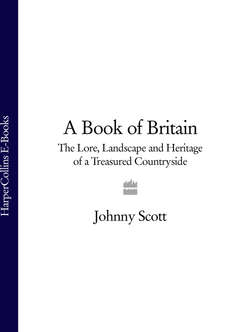Читать книгу A Book of Britain: The Lore, Landscape and Heritage of a Treasured Countryside - Johnny Scott - Страница 18
THE DAWN OF INDUSTRY
ОглавлениеBy the late seventeenth century, Britain had colonies in the West Indies, the western seaboard of America and a large part of Canada. The Royal African Company had established trading posts in West Africa to trade slaves in exchange for British goods, which would become the major economic mainstay for such western British cities as Bristol and Liverpool, which formed the third corner of the so-called triangular trade with Africa and the Americas. The East India Company had been in existence since 1600 and Britain acquired Bombay and Tangier in 1661, on the marriage of Charles II to Catherine de Braganza. When William of Orange ascended the English throne in 1688, bringing peace between the Netherlands and England, a deal between the two nations left the spice trade of the Indonesian archipelago to the Netherlands and the textiles industry of India to England.
One of William’s first acts after his coronation was to declare war on his old enemy, France, and to impose a trade embargo on French goods which was to have a profound effect on British agriculture. In the seventeenth century very little distilling of spirits was known in Britain; the Company of Distillers made spirits under strict regulations, mainly for apothecaries who used it as a base for medicines. Some home-made alcohol was sold by street vendors, described by Daniel Defoe as ‘Foul and gross, but they mixed them up with such additions as they could get, to make them palatable’. The rich drank imported French brandy and the embargo with France left a gap in the booze market, which William promptly filled in 1690 by passing an Act of Parliament ‘for encouraging the distilling of brandy and spirits from corn’.
This new industry would lead, the Act promised, to ‘the greater consumption of corn and the advantage of tillage in this Kingdom’. To help things along, he withdrew the monopoly on distilling from the Company of Distillers, removed virtually all regulations and, working on the theory that if spirits were cheap, more people would drink them, lowered the tax on spirits made from malted corn to a penny a gallon. British farmers now faced the challenge of demand created by colonisation and the new distilling industry; they had to improve production or go out of business.
The eighteenth century was a period of rapid change for every section of society, but none more so than for farmers, with landowners leading the way in agricultural improvements. The four-field rotation system was accepted as the new method of cultivation, the limitation being the hopelessly inefficient method of broadcasting seed by hand. It is obviously important that individual plants have sufficient space to grow and ripen, and there was an enormous amount of waste until Jethro Tull, a Berkshire landowner, invented a seed drill for sowing seed in rows. He also advocated the use of horses instead of oxen, which were still commonly used for farm work, and invented a horse-drawn hoe for clearing plant growth, particularly among turnip crops. The powerful Whig politician, Viscount Townsend, of Raynham Hall, in Norfolk, carried out a variety of improving experiments on his estate, mostly involving turnips. He was a fervent believer in the efficacious qualities of turnips for all agricultural improvements and became known as ‘Turnip Townsend’ from his habit of introducing his opinions of the plant into every conversation.
Joseph Foljambe of Rotherham, in Yorkshire, perfected a vastly superior plough which remained in use until the tractor was invented 170 years later.
